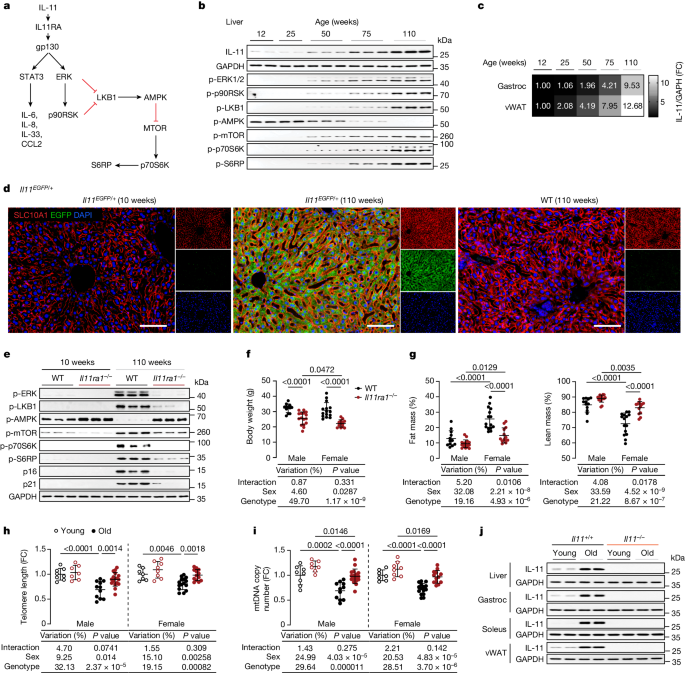Inhibition of IL-11 Signaling Extends Lifespan and Healthspan in Mammals
Core Concepts
Inhibition of the pro-inflammatory cytokine IL-11 can extend healthspan and lifespan in mice.
Abstract
The article examines the role of the pro-inflammatory cytokine IL-11 in the aging process and its impact on healthspan and lifespan in mammals. As mice age, IL-11 levels increase across cell types and tissues, regulating an ERK-AMPK-mTORC1 axis that contributes to cellular, tissue, and organismal-level aging pathologies.
The key findings are:
- Deletion of Il11 or Il11ra1 (the IL-11 receptor) protects against metabolic decline, multi-morbidity, and frailty in old age.
- Administration of anti-IL-11 antibodies to 75-week-old mice for 25 weeks improves metabolism, muscle function, and reduces aging biomarkers and frailty in both sexes.
- Genetic deletion of Il11 extends the lifespan of mice by 24.9% on average.
- Treatment with anti-IL-11 antibodies from 75 weeks of age until death extends the median lifespan of male mice by 22.5% and female mice by 25%.
The authors suggest that anti-IL-11 therapy, currently in early-stage clinical trials for fibrotic lung disease, may provide a translational opportunity to target aging pathologies in older people.
Customize Summary
Rewrite with AI
Generate Citations
Translate Source
To Another Language
Generate MindMap
from source content
Visit Source
www.nature.com
Inhibition of IL-11 signalling extends mammalian healthspan and lifespan - Nature
Stats
Genetic deletion of Il11 extended the lifespan of mice by 24.9% on average.
Treatment with anti-IL-11 antibodies from 75 weeks of age until death extended the median lifespan of male mice by 22.5% and female mice by 25%.
Quotes
"Deletion of Il11 or Il11ra1 protects against metabolic decline, multi-morbidity and frailty in old age."
"Administration of anti-IL-11 to 75-week-old mice for 25 weeks improves metabolism and muscle function, and reduces ageing biomarkers and frailty across sexes."
"Together, these results demonstrate a role for the pro-inflammatory factor IL-11 in mammalian healthspan and lifespan."
Key Insights Distilled From
by Anissa A. Wi... at www.nature.com 07-17-2024
https://www.nature.com/articles/s41586-024-07701-9
Deeper Inquiries
What are the specific mechanisms by which IL-11 inhibition leads to improved healthspan and lifespan in mammals?
IL-11 inhibition exerts its beneficial effects on healthspan and lifespan through multiple mechanisms. Firstly, IL-11 is involved in regulating the ERK–AMPK–mTORC1 axis, which plays a crucial role in cellular and tissue aging processes. By inhibiting IL-11 signaling, the dysregulation of these pathways is mitigated, leading to improved metabolic function, reduced multi-morbidity, and enhanced muscle function in aging mammals. Additionally, IL-11 inhibition helps in reducing inflammation, a key hallmark of aging, thereby protecting against age-associated diseases and frailty. These combined effects contribute to extending healthspan and lifespan in mammals.
How do the effects of IL-11 inhibition on aging compare to other known longevity interventions, such as caloric restriction or genetic manipulations?
IL-11 inhibition presents a unique approach to promoting longevity compared to other interventions like caloric restriction or genetic manipulations. While caloric restriction has been shown to extend lifespan by altering nutrient-sensing pathways and metabolic processes, IL-11 inhibition targets the inflammatory aspect of aging, which is a central hallmark of age-related diseases. Genetic manipulations, on the other hand, often involve altering specific genes or pathways to influence aging processes. IL-11 inhibition, by modulating the ERK–AMPK–mTORC1 axis and reducing inflammation, offers a distinct mechanism to improve healthspan and lifespan in mammals. Combining IL-11 inhibition with other interventions may potentially have synergistic effects on longevity, warranting further research in this area.
Could targeting IL-11 signaling have broader implications for the treatment of age-related diseases beyond just extending lifespan?
Targeting IL-11 signaling holds promise for addressing a wide range of age-related diseases beyond simply extending lifespan. Since IL-11 is involved in regulating various pathways associated with aging, inhibiting its signaling could have profound effects on mitigating age-related metabolic decline, frailty, and other pathologies. By improving metabolism, muscle function, and reducing aging biomarkers, IL-11 inhibition may offer therapeutic benefits for conditions such as sarcopenia, metabolic disorders, and frailty in older individuals. Furthermore, the anti-inflammatory effects of IL-11 inhibition could have implications for age-related inflammatory diseases, neurodegenerative disorders, and cardiovascular conditions. Therefore, targeting IL-11 signaling has the potential to not only extend lifespan but also improve the quality of life and reduce the burden of age-related diseases in the aging population.
0
